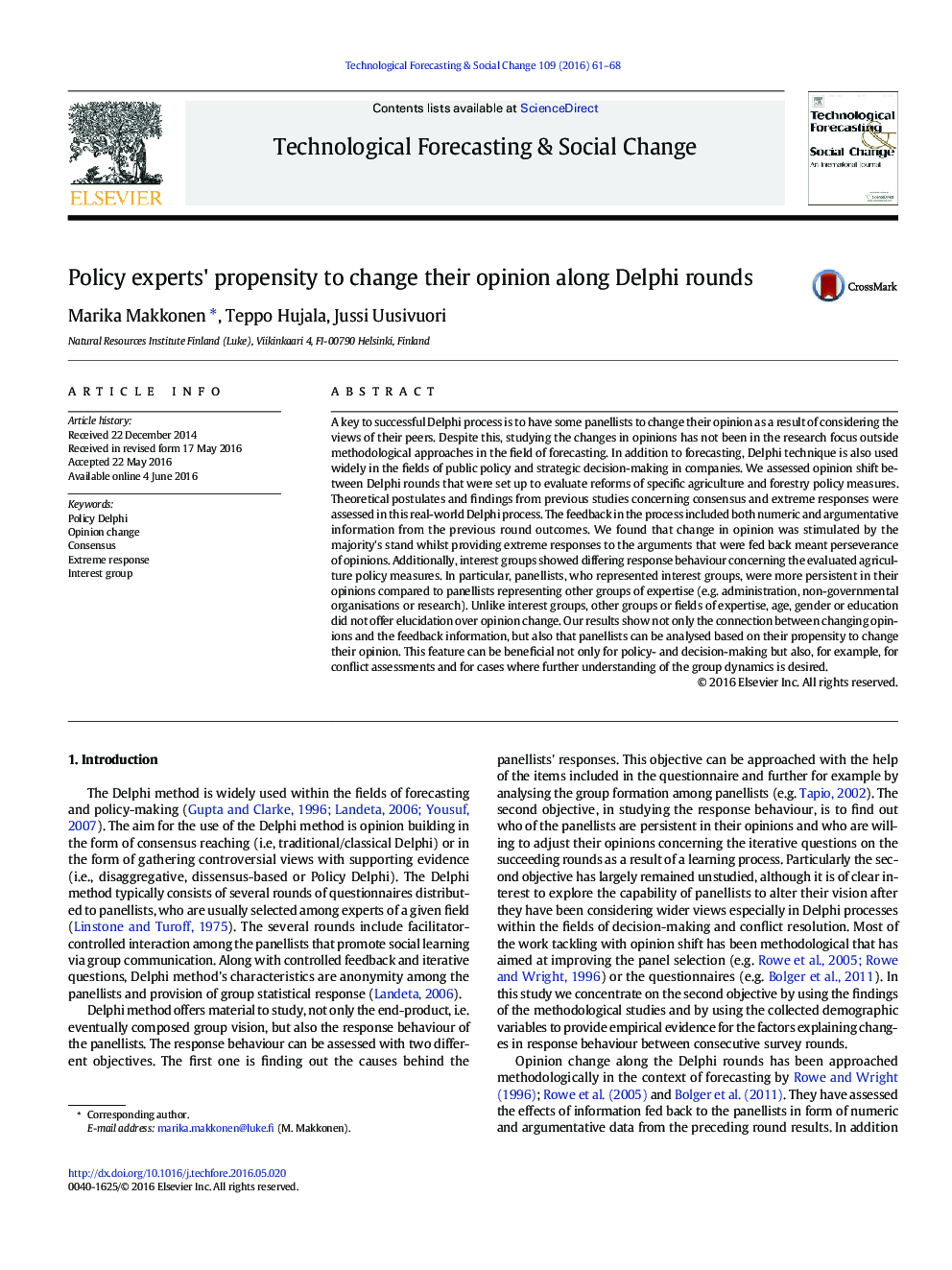| کد مقاله | کد نشریه | سال انتشار | مقاله انگلیسی | نسخه تمام متن |
|---|---|---|---|---|
| 7256018 | 1472391 | 2016 | 8 صفحه PDF | دانلود رایگان |
عنوان انگلیسی مقاله ISI
Policy experts' propensity to change their opinion along Delphi rounds
ترجمه فارسی عنوان
تمایل کارشناسان سیاست به تغییر نظرات خود در دوران دلفی
دانلود مقاله + سفارش ترجمه
دانلود مقاله ISI انگلیسی
رایگان برای ایرانیان
کلمات کلیدی
سیاست دلفی، تغییر دیدگاه اجماع، وفاق، پاسخ شدید گروه مورد،
ترجمه چکیده
کلید موفقیت روند دلفی، این است که برخی از اعضای گروه را در نظر بگیریم که نظرشان را در نتیجه دیدگاه های همتایانشان تغییر دهند. با وجود این، مطالعه تغییرات در نظرات در تحقیقات در خارج از رویکردهای روش شناختی در زمینه پیش بینی قرار نگرفته است. علاوه بر پیش بینی، تکنیک دلفی نیز به طور گسترده ای در زمینه سیاست های عمومی و تصمیم گیری استراتژیک در شرکت ها مورد استفاده قرار می گیرد. ما تغییر دیدگاه بین دورهای دلفی که برای ارزیابی اصلاحات اقدامات خاص کشاورزی و جنگلداری تعیین شد، مورد بررسی قرار گرفت. مفاهیم نظری و یافته های مطالعات قبلی درباره ی اجماع و پاسخ های شدید در این دلفی در دنیای واقعی ارزیابی شد. بازخورد در این فرایند شامل اطلاعات عددی و استدلال از نتایج دور قبلی بود. ما متوجه شدیم که تغییر در افکار توسط موضع اکثریت تحریک شده است، در حالیکه پاسخ های شدید به استدلال هایی که به عقب بازگردانده شده اند، به خاطر پشتکار بودن نظرات، تحریک شده است. علاوه بر این، گروه های ذینفع رفتارهای واکنش متفاوت نسبت به اقدامات ارزیابی سیاست کشاورزی نشان دادند. به طور خاص، پانلیست هایی که نمایندگان گروه های ذینفع را تشکیل می دادند، در نظراتشان پایدارتر بودند، در مقایسه با پانلیست هایی که نمایندگان گروه های دیگر تخصص بودند (مثلا دولت، سازمان های غیردولتی یا تحقیق). بر خلاف گروه های علاقه مند، گروه های دیگر یا زمینه های تخصص، سن، جنس و تحصیلات، توضیح بیشتری در مورد تغییر نظرات ارائه نمی دهند. نتایج ما نشان می دهد نه تنها ارتباط بین تغییر نظرات و اطلاعات بازخورد، بلکه همچنین می توان آن را بر مبنای تمایل خود برای تغییر نظر خود تحلیل کرد. این ویژگی می تواند نه تنها برای سیاست گذاری و تصمیم گیری سودمند باشد، بلکه برای مثال برای ارزیابی های درگیری و مواردی که درک بیشتر از پویایی گروه مورد نظر است.
موضوعات مرتبط
علوم انسانی و اجتماعی
مدیریت، کسب و کار و حسابداری
کسب و کار و مدیریت بین المللی
چکیده انگلیسی
A key to successful Delphi process is to have some panellists to change their opinion as a result of considering the views of their peers. Despite this, studying the changes in opinions has not been in the research focus outside methodological approaches in the field of forecasting. In addition to forecasting, Delphi technique is also used widely in the fields of public policy and strategic decision-making in companies. We assessed opinion shift between Delphi rounds that were set up to evaluate reforms of specific agriculture and forestry policy measures. Theoretical postulates and findings from previous studies concerning consensus and extreme responses were assessed in this real-world Delphi process. The feedback in the process included both numeric and argumentative information from the previous round outcomes. We found that change in opinion was stimulated by the majority's stand whilst providing extreme responses to the arguments that were fed back meant perseverance of opinions. Additionally, interest groups showed differing response behaviour concerning the evaluated agriculture policy measures. In particular, panellists, who represented interest groups, were more persistent in their opinions compared to panellists representing other groups of expertise (e.g. administration, non-governmental organisations or research). Unlike interest groups, other groups or fields of expertise, age, gender or education did not offer elucidation over opinion change. Our results show not only the connection between changing opinions and the feedback information, but also that panellists can be analysed based on their propensity to change their opinion. This feature can be beneficial not only for policy- and decision-making but also, for example, for conflict assessments and for cases where further understanding of the group dynamics is desired.
ناشر
Database: Elsevier - ScienceDirect (ساینس دایرکت)
Journal: Technological Forecasting and Social Change - Volume 109, August 2016, Pages 61-68
Journal: Technological Forecasting and Social Change - Volume 109, August 2016, Pages 61-68
نویسندگان
Marika Makkonen, Teppo Hujala, Jussi Uusivuori,
